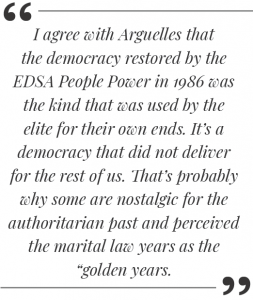
This year, however, it was not officially declared a national holiday because, according to the Office of the President, “there is a minimal socio-economic impact in declaring such day as a special non-working holiday since it coincides with the rest day for most workers.”
Yes, February 25 this year falls on a Sunday. Just like December 8, the Feast of the Immaculate Conception of Mary, falls on a Sunday, too, but is officially declared a special non-working holiday.
August 21, Ninoy Aquino Day, which falls on a Wednesday this year, is also a special non-working holiday.
August 21 is a holiday as mandated by Republic Act 2956 and December 8 is also a holiday as mandated by Republic Act 10966.
It turns out that making February 25 a holiday has largely been left up to the discretion of presidents through a presidential proclamation since there is no law that designates it as such.
And that is why Representative Edcel Lagman (Albay, First District) filed House Bill 9405 in October 2023 declaring February 25 of every year as a regular, national public non-working holiday to commemorate the 1986 EDSA People Power. It has not yet been made into a law at this time.
So there is that. February 25 is not a national holiday mandated by law. It is up to the president to issue a proclamation. The current president thinks there is no need since it falls on a Sunday, a non-working day for most people, anyway.
But even without the legal mandate, do Filipinos still consider February 25 a special day that deserves a proper commemoration and non-working holiday declaration?
Based on the Social Weather Station (SWS) survey done last year, 62 percent of Filipinos still believe that the spirit of the EDSA People Power remains alive and 57 percent believe that the annual commemoration of the event is still important.
However, there were almost half of the respondents or 47 percent, who believe that only a few of the promise of the EDSA People Power were fulfilled while 28 percent said there was none to almost none of the promises were realized.
If I will just base it on that 2023 survey, Filipinos still believe what happened in February 25 was a glorious moment in our country’s history. But it looks like it was just a moment in time and the social change it promised did not really happen in the succeeding years.
Cleve V. Arguelles, political science instructor from the University of the Philippines, wrote in theconversation.com in December 2016: “The 1986 revolution, once a symbol of the promise of democracy and prosperity, is now synonymous in the Filipino popular imagination with the dysfunctional transport system in Metro Manila.”
Meaning the spirit of EDSA now most likely invoke traumatizing traffic jams.
Arguelles noted that Marcos’ authoritarian rule was just replaced by an elite-dominated democracy. “A small number of families started to restore their control of the government and rotate the seats of power for themselves. They included the Marcos family, who returned from exile in 1991 and were welcomed by their allies,” he wrote.
I agree with Arguelles that the democracy restored by the EDSA People Power in 1986 was the kind that was used by the elite for their own ends. It’s a democracy that did not deliver for the rest of us. That’s probably why some are nostalgic for the authoritarian past and perceived the marital law years as the “golden years.”
We had many agencies created post-EDSA to prevent the abuses of the past like the Commission on Good Government and Commission on Human Rights. Yet corruption and human rights violations not only persist but go unpunished.
As the late Asian Studies professor Benito Lim said in an interview in 2009: “EDSA People Power was not a genuine revolution or a common desire to institute common programs addressing issues and problems of the republic.”
Previously, Professor Lim had written a paper published in the Asian Studies Journal about “Cory’s People Power” two months after February 25, 1986 and I found his take on what “people power” meant in the Philippine context very interesting.
“Like most labels in Philippine politics, people power stands for a mosaic of groups and programs whose parts do not fit together neatly,” he wrote.
He noted that the diverse groups did not have any common ground except for their anti-Marcos sentiment. Their other aims are “far from harmonious and at times oppose one another.”
To emphasize his point, he quoted American diplomat Henry Kissinger’s observation: “”Even with democratic impetus, it is highly likely that when the immediate euphoria has worn off, disparate tendencies will begin to contest for primacy. The history of revolutions teaches that the coalition of resentments which united the opposition disintegrates once the status quo is overthrown.”
And that’s what happened to our people power.
When the euphoria died down, the victors were the vested interest groups. Those who are savvy in promoting their vested interests and experts at seizing opportunities (like the “balimbings”) and exploiting uncertain conditions to their advantage.
So could we blame the people for thinking they do not have the power to change things in this country?
They know they are mere pawns being used by the elite and by other vested interest groups. In showbiz lingo, they are mere props so something can be called “of the people, for the people, and by the people.” Like the so-called “people’s initiative” for charter change.
Sometimes people play along because they are forced by circumstance and dire need. Or sometimes because people think that even when they resist — like what they believed happened in 1986 as a real collective expression of people power — it will all be futile, anyway.
